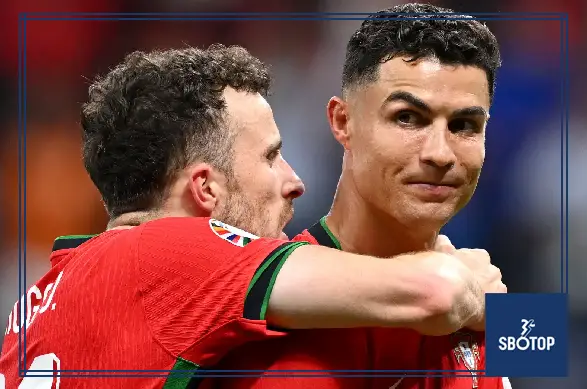In the world of football, few names resonate louder than Cristiano Ronaldo. The Portuguese superstar is a symbol of greatness, a global icon, and an unwavering figure of discipline and professionalism. But even the strongest icons are not immune to moments of grief and personal heartbreak. Recently, the footballing world was struck by tragedy with the untimely and shocking passing of Diogo Jota, a rising Portuguese talent who was just beginning to leave a significant mark on the sport. While tributes poured in from across the globe, one absence that did not go unnoticed was that of Cristiano Ronaldo himself.
As fans and fellow players gathered to bid farewell to Jota, many were left wondering why the five-time Ballon d’Or winner, a figure central to Portuguese football and known for his unity with teammates, was not seen at the funeral. This silence sparked speculation online—until Katia Aveiro, Cristiano Ronaldo’s older sister, finally stepped forward to clarify the situation. In a candid and emotional post on social media, Katia revealed the deeply personal and heartfelt reason behind her brother’s absence, offering insight into a side of Ronaldo rarely seen by the public.
This article explores that revelation, the relationship between Ronaldo and Jota, the impact of Jota’s passing on the Portuguese football community, and the emotional weight of grief in the life of a man so often perceived as untouchable.
The Tragic Passing of Diogo Jota
Before diving into Ronaldo’s response, it is important to revisit the shocking event that shook Portugal and the global football community. Diogo Jota, the 28-year-old Liverpool and Portugal forward, tragically passed away following complications from a sudden and rare medical condition. According to official reports, Jota was hospitalized following a routine training session where he complained of chest pains and fatigue. Within 48 hours, his condition deteriorated rapidly due to a severe cardiac issue, and he passed away despite medical intervention.
The news hit the footballing world like a thunderbolt. Jota was not only a key player for Liverpool and Portugal but a beloved teammate, father, and role model. His dedication, humility, and quiet brilliance on the field earned him the respect of fans and professionals alike. Clubs around Europe observed moments of silence, players wore black armbands, and tributes flooded social media.
Cristiano Ronaldo’s Silence Raises Eyebrows
In the midst of the mourning, Cristiano Ronaldo’s absence was conspicuous. Known for his vocal support for teammates and frequent public statements on issues affecting the football community, his silence sparked speculation. Was he injured? Was there a falling out? Was he affected in ways he could not share? The Portuguese captain did not post any tribute immediately, nor did he appear at the funeral service held in Porto, attended by current and former Portugal teammates, coaches, and thousands of supporters.
In the absence of clarity, fans speculated. Some criticized, others defended. The emotional weight of the moment grew heavier—until Katia Aveiro broke the silence.
Katia Aveiro Speaks Out: A Sister’s Perspective
In an emotional Instagram post accompanied by a black-and-white photo of her younger brother deep in thought, Katia Aveiro addressed the swirling questions. Her caption was simple yet powerful:
“My brother is many things. A champion. A father. A son. But above all, he is a human being. He mourns not loudly, but deeply. Cristiano loved Diogo like a brother, and the pain of this loss is more than words can express. Sometimes silence is not absence—it is grief.”
She went on to explain that Ronaldo had chosen to mourn privately, away from the public eye, because attending the funeral would have brought an overwhelming level of media attention that could have shifted focus away from Jota and his family. His presence, Katia said, would have turned a solemn and personal farewell into a public spectacle—something Ronaldo “desperately wanted to avoid out of respect for Diogo’s loved ones.”
“Cristiano told me, ‘This is not my moment. This is Diogo’s family’s moment. They need peace. They need space. I will honor him in my heart, and in how I play every day moving forward.’”
This revelation not only humanized Cristiano Ronaldo but also underscored the difficult line public figures must walk during personal tragedies. When your life is under constant scrutiny, even grief becomes performative in the eyes of the public. For Ronaldo, choosing privacy over presence was not a lack of care—it was the ultimate sign of respect.
Ronaldo and Jota A Bond Beyond the Pitch
Though nearly a decade separated their careers, Ronaldo and Jota developed a close relationship through their shared time with the Portuguese national team. Jota often expressed his admiration for Ronaldo, calling him “the ultimate mentor” and “the person who raised the standard for all of us.” Ronaldo, in turn, took pride in the younger generation’s success and often highlighted Jota’s humility and work ethic in interviews.
During the Euro 2020 tournament, it was common to see Ronaldo and Jota exchanging ideas on the pitch and during training sessions. Ronaldo even assisted Jota’s goal against Germany in the group stage, and their celebration—a signature Ronaldo leap followed by a low-five—became one of the tournament’s most heartwarming moments for Portuguese fans.
Behind the scenes, Jota reportedly became close to Ronaldo’s eldest son, Cristiano Jr., who admired the Liverpool forward’s calm demeanor and technical skill. In a world of egos and rivalries, the Ronaldo-Jota connection stood out as one built on mutual admiration and quiet friendship.
The Emotional Toll of Public Grief
For many fans, Katia Aveiro’s statement served as a reminder that footballers, no matter how legendary, are not immune to grief’s complexity. While some mourn in public, others retreat into solitude. Ronaldo, often seen as an emotional rock and relentless competitor, has faced many personal challenges in recent years—from the tragic loss of his infant son to injuries and intense media scrutiny in his twilight career.
Choosing not to attend the funeral was not a sign of indifference, but a decision born of love, pain, and deep respect. As Katia said, “My brother carries his grief quietly, like many do. He doesn’t need a camera to prove his heart is broken.”
Psychologists specializing in sports mental health often speak about the burden of being in the public eye while navigating personal trauma. The expectations of constant performance, stoicism, and leadership can leave little room for vulnerability. Ronaldo, who is expected to lead Portugal into the 2026 World Cup as an elder statesman, must constantly balance public duty with private pain.
Tributes in His Own Way
In the days following the funeral, Ronaldo returned to the pitch with Al-Nassr, his Saudi Arabian club. During his first match back, after scoring a goal, he pointed to the sky and made a subtle gesture—tapping his heart and mouthing the word “Diogo.” No hashtags, no cameras zooming in, no speeches. Just a simple tribute from one player to another.
In a post-match interview, Ronaldo said only this:
“Some things are too hard to talk about. But we carry people with us. Every step, every goal. Diogo is with us.”
These words were enough for many fans. In a time where social media often demands spectacle, Ronaldo’s quiet dignity was applauded. He didn’t need to make a public statement because his actions—and now his sister’s revelation—spoke volumes.
Also Read:
- SBOTOP Rising Star Secured: Club América Sign Isaías Violante from Toluca as Second Reinforcement for Apertura 2025
- SBOTOP Golden Boot Glory: Who’s Leading the Scoring Charts at the 2025 FIFA Club World Cup
- SBOTOP Leo’s Joy Is on the Pitch: Mascherano Justifies Messi’s Full 90 Minutes in Inter Miami’s 4-1 Win Over CF Montreal










